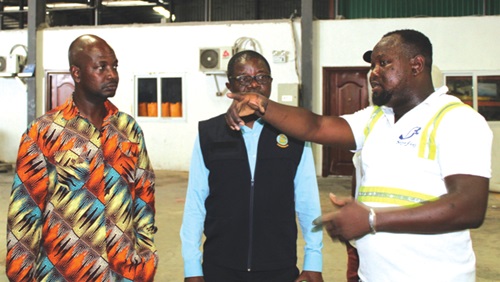
Management of GIDA charged to make schemes viable
The Board Chairman of the Ghana Irrigation Development Authority (GIDA), Frank Afari Ankamah, has charged the management of the authority to make the scheme viable and self-reliant.
Advertisement
He said they must be able to generate enough revenue to sustain the scheme and not to be dependent on the government for funding always. Mr Ankamah gave the charge when he visited the Kpong Irrigation Scheme (KIS) to observe their operations and familiarise himself with their activities.
He was led round by the Chief Executive Officer of GIDA, Ing Richard Oppong-Boateng, the Board Secretary, Mrs Helen Adamah, and the Public Relations; Officer of the authority, Mrs Yvonne Mamle Addison.
The chairman explained that "the main reason for my tour is to advice and ensure that all the scheme managers have a commercial concept in mind”. “This will help the schemes to be revenue generating and make profit to ensure sustainability. All the scheme managers should have a commercial mindset when performing their activities," he added.
Kpong Irrigation Scheme
The KIS is one of the over 180 schemes operated and managed by GIDA, a subsidiary of the Ministry of Food and Agriculture (MoFA), across the country. It oversees GIDA's irrigation facilities and lands measuring over 4,000 hectares, stretching from Akuse in the Lower Manya Krobo District in the Eastern Region to Asutsuare and Osuwem in the Shai-Osudoku District in the Greater Accra Region.
The scheme provides water to rice farms, banana plantations, fish farms and industries in the aforementioned towns and along the bank of the Volta River. It also provides seeds to over 2,000 smallholder farmers and offers technical support to farmers registered under the scheme.
Mr Ankamah lauded the management of KIS for putting in good measures to run the scheme over the years. "I am impressed with the activities of KIS so far but you need to do more. With the tenants of the scheme, we need to be generating more than we have now.
“So we will go back and discuss with the rest of the board members how to device a strategy to make sure that all the schemes are generating revenue," he added.
Seed production
Ing Oppong-Boateng, said the authority aimed at making KIS the major seed provider for farmers in the southern part of the country in the short term, and consequently expand to cater for the northern sector in the long term.
"To ensure synergy with other rice seed producers in the country, KIS management has to collaborate with other development partners such as Korea International Cooperation Agency (KOICA), Korea Programme on International Agriculture (KOPIA) and others who are into rice seed production," he said.
Ing Oppong-Boateng further said that after the completion of phase two of the rehabilitation and modernisation of the scheme by the Food Systems Resilience Project (FSRP) under MoFA, the automation system to be deployed would support in the running of the scheme commercially.
The Manager of KIS, Evans Lamptey, said his outfit intended to increase its seed production capacity by expanding the land area based on demand and available resources.



